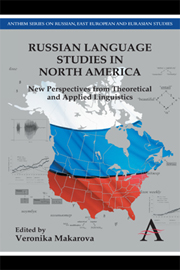Book contents
- Frontmatter
- Contents
- List of Tables and Figures
- Introduction
- Part One Language Structures and their Interface
- 1 Phonetics. Tracing Emotions in Russian Vowels
- 2 Phonology. Vowel–Zero Alternations in Russian Prepositions: Prosodic Constituency and Productivity
- 3 Morphology and Lexicology Interface. Latest Russian Neologisms: The Next Step towards Analytism?
- 4 Syntax. Bi-nominative Sentences in Russian
- 5 Psycholinguistics. The Effect of Grammatical Gender in Russian Spoken-Word Recognition
- Part Two Applied Linguistic and Sociolinguistic Analysis
- Afterword
- Index
5 - Psycholinguistics. The Effect of Grammatical Gender in Russian Spoken-Word Recognition
from Part One - Language Structures and their Interface
Published online by Cambridge University Press: 05 November 2012
- Frontmatter
- Contents
- List of Tables and Figures
- Introduction
- Part One Language Structures and their Interface
- 1 Phonetics. Tracing Emotions in Russian Vowels
- 2 Phonology. Vowel–Zero Alternations in Russian Prepositions: Prosodic Constituency and Productivity
- 3 Morphology and Lexicology Interface. Latest Russian Neologisms: The Next Step towards Analytism?
- 4 Syntax. Bi-nominative Sentences in Russian
- 5 Psycholinguistics. The Effect of Grammatical Gender in Russian Spoken-Word Recognition
- Part Two Applied Linguistic and Sociolinguistic Analysis
- Afterword
- Index
Summary
Introduction
Linguistics is experiencing a fundamental shift in the way it studies language as its object of investigation. While traditional linguistics relied on the introspection of researchers and used a top-down approach that led from theory to empirical facts, modern linguistics is rapidly shifting to an empirical, data-driven investigation of language phenomena (Featherston and Winkler 2009). As experimental data become more and more critical for linguistic theories, this change in paradigm puts psycholinguistics, a branch of linguistics that studies the psychological mechanisms underlying language performance, at the forefront of language science.
Main themes in psycholinguistics closely match the traditional subfields of theoretical linguistics, but the crucial difference between the two is methodology: Psycholinguistics is based on experimental techniques which supply participants' judgments of language stimuli and offer an insight into immediate, moment-to-moment language. Psycholinguistic data often become the critical evidence for distinguishing between competing linguistic theories, as is exemplified by a debate between the head-driven phrase structure grammar (Pollard and Sag 1994) and the government-binding generative grammar (Chomsky 1986) about the nature and typology of empty categories in syntax (Fodor 1993). In addition, psycholinguistic data can provide a powerful impetus for new developments in influential theoretical models, as is the case with the cohort model of spoken-word recognition by Marslen-Wilson (Marslen-Wilson and Welsh 1978).
Slavic psycholinguistics is no exception; for the past ten years, the main forum for theoretical Slavic linguistics in the US, the annual Workshop on Formal Approaches to Slavic Linguistics (FASL), has included psycholinguistic talks that illuminate the contribution of experimental studies of Russian, Serbian, Croatian, Bulgarian and Polish to a variety of topics in linguistic theory ranging from verbal morphology to discourse (Sekerina 2006).
- Type
- Chapter
- Information
- Russian Language Studies in North AmericaNew Perspectives from Theoretical and Applied Linguistics, pp. 107 - 130Publisher: Anthem PressPrint publication year: 2012
- 1
- Cited by



